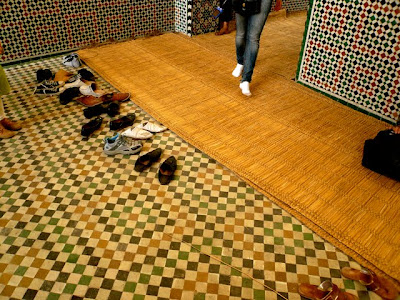So, instead of doing something productive like starting the two essays I have due on Tuesday, or packing for Marseille (I leave tomorrow, great excitement!), or even putting photos up on this blog (which is the only part that most of you care about anyway), I am going to bitch about Facebook. (Because that's what the internet needs, yet another blog post about Facebook. I'm only perpetuating the problem, aren't I.)
My relationship with Facebook can be characterized by a relatively simple outline.
I. Infatuation
This stage of the Facebook Problem begins with the creation of a Facebook account and generally continues for the duration of a user's time in high school. New users usually exhibit certain characteristic reactions to their first Facebook exposure, notably:
a. Wasting hours clicking through thousands of their friends' photos;
b. Agonizing over the perfect, pithy-yet-alternative quote for their profile;
c. Stalking the profiles of potential/former romantic interests;
d. Writing on their friends' walls just because they can and making an effort to sound clever, in the hope that all mutual friends will click on "See Wall-to-Wall" and realize how cool the user is;
e. Listing books they have never read and/or bands they have never heard of as their Favorites, in an attempt to sound cool;
f. Friending anyone who ever attended their high school, ever, to up their friend count;
g. Treating Facebook like a jacked-up Twitter account and posting hourly status updates;
h. Creating 7 different "Limited Profiles" to make sure they avoid any unpleasant situations when Mom and Dad finally decide to be Cool and create accounts;
i. Photoshopping their profile picture into strange color schemes.
During the Infatuation Stage, users generally check Facebook multiple times a day and exhibit signs of distress when prevented from doing so for more than six hours at a time, except while sleeping. Those in possession of Smart Phones (as opposed to Dumb Phones, obviously) download applications to allow them to access Facebook from their mobile phones, thus creating a constant, low-level exposure and furthering the dependence. Relatedly, users expect responses to all Facebook communications within hours, or there will be Drama.
Users are often irritable when interrupted by family members or friends who attempt to communicate with them through other media, including face-to-face discussions.
This stage of the Facebook Problem generally begins to fade as a user matures, exhausts all of his or her friends' photo albums, and re-learns how to properly use a telephone and write an email. Users gradually transition into:
II. Utility
During this stage of the Facebook Problem, users begin to use Facebook for activities other than stalking their friends [see Stage I part c]. Facebook also assumes its own role in the Pyramid of Remote Social Communication, described as follows:
a. Calling or texting: The most select method of communication, calling or texting occurs among family members, close friends, roommates, and people with whom a user interacts on a daily basis.
b. Email: Emails, generally written with a specific purpose, occur between acquaintances who are close enough to have exchanged email addresses but have not yet crossed the Line of Familiarity into exchanging phone numbers or text messages. [Note: during periods of travel or when use of a cell phone is impractical, email may surpass calling or texting.]
c. Private Facebook message: These messages, which are viewable only to the parties to whom the messages are sent [in theory; see Stage IV: Distrust], serve a function similar to email's, but generally occur among acquaintances who are Facebook Friends but have not exchanged emails. [Note: looking up an email address from a Facebook Profile may or may not be socially acceptable, depending on the context.]
d. Facebook wall post: Wall posts, viewable to all, are the lowest level of remote social communication and usually occur among users who are merely acquaintances about things like classwork.
[Note: this pyramid does not apply to communication that falls outside of social contexts; for example, professional and/or work environments and relationships do not follow the same structure. Also, the pyramid is drastically skewed towards the Facebook end during Stage I, and it is only after the progression into Stage II that it becomes a reliable gauge.]
III. Indifference
This third stage of the Facebook Problem also develops gradually. Users are no longer either infatuated by Facebook [see Stage I] or appreciative of its usefulness [see Stage II], having developed alternative and more efficient methods to accomplish what used to fall in the domain of Facebook. Facebook fades into the background to reside next to dozens of a user's other online habits (including at least three email accounts, daily webcomics, news media, and specific blogs checked on a daily basis). Users generally check Facebook once or twice a day to make sure they do not ignore any Wall Posts or messages, but otherwise exhibit none of the interest characteristic of the two previous stages.
In more severe cases of Stage III, a user's indifference towards Facebook may develop into annoyance at the added online responsibility, at which point users transition into Stage IV. If users have multiple friends who use Obnoxious (TM) Applications, including but not limited to FarmVille, Become a Ninja Assassin, or Personality Tests [e.g. "What color sparkly unicorn are you?"], or are constantly asked by friends to Become a Fan of [something completely unrelated to their interests], annoyance may develop more quickly.
IV. Distrust
This fourth and final stage of the Facebook Problem occurs years after first exposure. Usually prompted by various changes in Facebook's privacy policy, which come in intervals of about four to five months, users finally realize how little control they have over what is linked to their names on the internet. Fed up with the online responsibility, which at this point has ceased to benefit the user at all, and with the growing suspicion that Facebook does not have their best interests at heart, users begin to distrust Facebook.
At the end of Stage IV, a user will attempt to remove all personal information from Facebook and delete his or her account, ending the Facebook Problem. The subsequent realization that it is not possible to actually delete everything, including Wall Posts, Photos, private messages, networks, and other connections, will often produce nervousness, suspicion, irritation, and occasionally anger. Many technology-savvy users will attempt to run programs to purge their online Facebook profiles and delete the information Facebook has stored about them, only to realize that Facebook actively blocks these applications, petulantly holding on to all the information. Eventually, a user will give up on erasing the information and simply deactivate the account, leaving the information accessible to anyone who can access the inner workings of Facebook.
All tongue-in-cheek joking aside, however. I personally have progressed to Stage IV; after hovering comfortably in Stage III for the past two years, I temporarily regressed to Stage II after coming to Madrid but then jumped forward to Stage IV with the recent unveiling of Facebook's new privacy policies and my realization of how little information about yourself you actually have control over, once it's on Facebook.
And thus, my rant. I am deleting my Facebook as much as I can as soon as I get back to the States and no longer use it as a primary method of communication like I do here in Spain.
Final note: I grew up parallel to Facebook, just a few years younger than its target audience (I'm actually just a few years younger than its founder and now multi-kajillionaire Mark Zuckerberg, how's that to make one feel inadequate), and thus used it in its original form (anybody remember poking, or having to tailor all your statuses so they fit with "Linden is _____"?). My perceptions may be slightly skewed.
Thursday, April 29, 2010
Wednesday, April 28, 2010
The internet is a weird place
For the past week I have been unable to access the New York Times from my computer, through either Firefox or Safari.
For about half a day I gave them the benefit of the doubt, thinking maybe there was increased traffic and their server had given up in despair. (Which didn't really make sense anyway, because I was always trying to access it at like 4am New York time.) But after a day, I decided that that was ridiculous, and I also wanted to read Roger Cohen's recent op-ed about the Middle East that everyone was talking about, and the Gail Collins one where she rips into both the Dems and the GOP, because that's always entertaining. (I'd link, but uh, yeah, it's broken.)
Then I tried a proxy server. It worked perfectly. I have now been reading the New York Times through a proxy server for the better part of this week. (This is funny because people mostly use these things to get around firewalls at work or privately look at porn. I'm using it to read the news - I feel like I'm in China, or perhaps Iran, or something.)
I have no idea what I did to block my computer (not just my browser, it's Firefox and Safari, and I very rarely use the latter) from accessing the New York Times website, and I have no idea how to undo it. And honestly, what a random website to be blocked from! But whatever, at least I have my news back.
Sometimes the internet is a strange place.
For about half a day I gave them the benefit of the doubt, thinking maybe there was increased traffic and their server had given up in despair. (Which didn't really make sense anyway, because I was always trying to access it at like 4am New York time.) But after a day, I decided that that was ridiculous, and I also wanted to read Roger Cohen's recent op-ed about the Middle East that everyone was talking about, and the Gail Collins one where she rips into both the Dems and the GOP, because that's always entertaining. (I'd link, but uh, yeah, it's broken.)
Then I tried a proxy server. It worked perfectly. I have now been reading the New York Times through a proxy server for the better part of this week. (This is funny because people mostly use these things to get around firewalls at work or privately look at porn. I'm using it to read the news - I feel like I'm in China, or perhaps Iran, or something.)
I have no idea what I did to block my computer (not just my browser, it's Firefox and Safari, and I very rarely use the latter) from accessing the New York Times website, and I have no idea how to undo it. And honestly, what a random website to be blocked from! But whatever, at least I have my news back.
Sometimes the internet is a strange place.
Tuesday, April 27, 2010
The good, the bad and the ugly
Bad news: I applied for a summer job on the east coast that paid a ridiculously large amount of money, but I didn't get it.
On the other hand, I'm spending the summer in California!
Good news: I did, however, receive funding for my linguistics thesis research this summer. I am officially a "Collegiate Research Scholar" with an "Undergraduate Research Grant."
Ugly news: I'm more and more ready to go home. Good thing summer's almost here.
Also, it is now really, really hot. Madrid skipped spring...
On the other hand, I'm spending the summer in California!
Good news: I did, however, receive funding for my linguistics thesis research this summer. I am officially a "Collegiate Research Scholar" with an "Undergraduate Research Grant."
Ugly news: I'm more and more ready to go home. Good thing summer's almost here.
Also, it is now really, really hot. Madrid skipped spring...
Sunday, April 25, 2010
Fez
Our final stop in Morocco was Fez, which I absolutely loved.





Roaming the markets!


I just cannot get over how intricately beautiful this script is.

Yes, the burro is carrying empty coke bottles.



We spied on some artisans.

View of a tannery. It smelled great, let me tell you. They gave us mint sprigs to hold under our noses.

I was enlisted as a model for traditional Moroccan garb.


Performers at dinner one night.

Inside.


View from the roofs.



I think I take too many pictures of food.


I loved the colors of this city.
And thus concludes my Morocco trip. You know, a few weeks late. I've been busy.





Roaming the markets!


I just cannot get over how intricately beautiful this script is.

Yes, the burro is carrying empty coke bottles.



We spied on some artisans.

View of a tannery. It smelled great, let me tell you. They gave us mint sprigs to hold under our noses.

I was enlisted as a model for traditional Moroccan garb.


Performers at dinner one night.

Inside.


View from the roofs.



I think I take too many pictures of food.


I loved the colors of this city.
And thus concludes my Morocco trip. You know, a few weeks late. I've been busy.
Friday, April 23, 2010
"Do re mi" is the same in every language
So I may have mentioned previously that one of my host sisters, Violeta, plays the recorder occasionally.
Apparently it's required for her music class, which is an entire class period, just like science or English, in which they learn music history, music theory, an instrument, and how to read notes and rhythms. (This is a public school she goes to. It is also bilingual in Spanish and English. Every time I talk to any Spanish person about the education system in Spain or Europe in general, I want to throw up my hands and shout really, really loudly at my fellow Americans who bitch about how great things are right now, nobody needs to change anything, I want to keep my money and spend it on gas for my Hummer instead of giving this country's children a chance to learn about music, get your government and its taxes out of my backyard and sure, go ahead and cut out music, art, computer skills, and foreign languages out of our public schools, see if I care.)
Last night she was whining about her music homework. I offered to help her, and she looked at me skeptically but showed me her book. (I did decline her offer to play her recorder.)
She was suitably impressed with my ability to hum melodies, spit out solfege syllables and clap syncopated rhythms, but the entertaining part was when she began quizzing me about the composers she has to know. ("Bach," she would say, and I would respond "Johann Sebastian" and "Baroque," or "Bizet," and "Georges, Romantic.") While I'm sure my own butchering of German or Russian names was hilarious to her (and would make any native speaker's ears bleed), hearing the "Spanish" pronunciation of "Tchaikovsky" or "Beethoven" was ridiculously entertaining and endearing.
I am proud to say I knew every composer she threw at me. After fifteen years, I'm just glad to realize most of it actually sunk in.
Apparently it's required for her music class, which is an entire class period, just like science or English, in which they learn music history, music theory, an instrument, and how to read notes and rhythms. (This is a public school she goes to. It is also bilingual in Spanish and English. Every time I talk to any Spanish person about the education system in Spain or Europe in general, I want to throw up my hands and shout really, really loudly at my fellow Americans who bitch about how great things are right now, nobody needs to change anything, I want to keep my money and spend it on gas for my Hummer instead of giving this country's children a chance to learn about music, get your government and its taxes out of my backyard and sure, go ahead and cut out music, art, computer skills, and foreign languages out of our public schools, see if I care.)
Last night she was whining about her music homework. I offered to help her, and she looked at me skeptically but showed me her book. (I did decline her offer to play her recorder.)
She was suitably impressed with my ability to hum melodies, spit out solfege syllables and clap syncopated rhythms, but the entertaining part was when she began quizzing me about the composers she has to know. ("Bach," she would say, and I would respond "Johann Sebastian" and "Baroque," or "Bizet," and "Georges, Romantic.") While I'm sure my own butchering of German or Russian names was hilarious to her (and would make any native speaker's ears bleed), hearing the "Spanish" pronunciation of "Tchaikovsky" or "Beethoven" was ridiculously entertaining and endearing.
I am proud to say I knew every composer she threw at me. After fifteen years, I'm just glad to realize most of it actually sunk in.
Thursday, April 22, 2010
Rabat and Meknes
On day two of my Morocco trip, we visited Rabat and Meknes.
Without further ado...





Welcome to Rabat.



The old part of the city. (No, I promise we didn't go to Greece no matter how much it looks like it.)

We had tea and cookies! (I didn't even try to eat the cookies. That tea is the most delicious stuff ever, however, and has enough sugar in it so it's basically like a dessert anyway.)


Ocean!



The Changing of the Guard, Morocco-style. (Apparently they color code the horses. Yes, really.)


I fell in love with the concept of making letters and words themselves the art. Astonishing.

Tomb.

If you've never had tagine before, go to a legitimate Moroccan restaurant and order it. It's world-changing. This is chicken with almonds and preserved lemon.

And this is some sort of chili paste (yes, it's as hot as it looks) that I delightfully smeared all over my chicken and then relished the sensation of my lips burning for half an hour after. Spices!!!!!

This dessert is more my style. Oranges covered in powdered sugar, cinnamon, mint and orange flower oil. (No almond paste required!)




And then we drove to Meknes! (Yes, that was only half of one day.)





Mosque.


No shoes, of course.
Coming soon: Fez! (My favorite part.)
Without further ado...





Welcome to Rabat.



The old part of the city. (No, I promise we didn't go to Greece no matter how much it looks like it.)

We had tea and cookies! (I didn't even try to eat the cookies. That tea is the most delicious stuff ever, however, and has enough sugar in it so it's basically like a dessert anyway.)


Ocean!



The Changing of the Guard, Morocco-style. (Apparently they color code the horses. Yes, really.)


I fell in love with the concept of making letters and words themselves the art. Astonishing.

Tomb.

If you've never had tagine before, go to a legitimate Moroccan restaurant and order it. It's world-changing. This is chicken with almonds and preserved lemon.

And this is some sort of chili paste (yes, it's as hot as it looks) that I delightfully smeared all over my chicken and then relished the sensation of my lips burning for half an hour after. Spices!!!!!

This dessert is more my style. Oranges covered in powdered sugar, cinnamon, mint and orange flower oil. (No almond paste required!)




And then we drove to Meknes! (Yes, that was only half of one day.)





Mosque.


No shoes, of course.
Coming soon: Fez! (My favorite part.)
Subscribe to:
Posts (Atom)